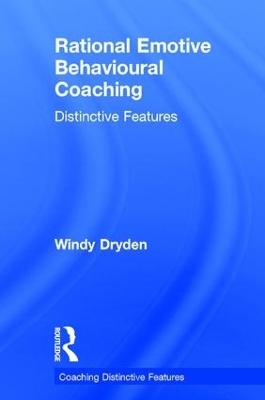
Rational Emotive Behavioural Coaching
Routledge (Verlag)
978-1-138-06541-3 (ISBN)
This concise and accessible book introduces the 30 Distinctive Features of Rational Emotive Behavioural Coaching, also known as REBC, an approach which applies the principles of REBT to coaching. Divided between 10 theoretical and 20 practical features, the book covers a range of topics, including meaning and values, development, the working alliance, dealing with obstacles and common coachee problems.
The book sets out two different approaches: development-focused REBC, which concentrates on the coachee’s areas of development, and problem-focused REBC, which concentrates on the coachee’s practical and emotional problems of living. Within the latter category, the book also distinguishes between practical problem-focused REBC and emotional problem-focused REBC. Rational Emotive Behavioural Coaching: Distinctive Features will be an essential reference for anyone seeking to understand the key features of this unique approach to coaching.
Windy Dryden, Ph.D., is in part- time clinical and consultative practice and is an international authority on cognitive behaviour therapy (CBT). He is Honorary Vice President of the International Society for Coaching Psychology, was granted honorary membership in the International Association of Cognitive Behavioral Coaching in 2014 and is Emeritus Professor of Psychotherapeutic Studies at Goldsmiths University of London. He has worked in the helping professions for more than 40 years and is the author and editor of over 215 books.
Introduction
PART I THEORY
1 Rational Emotive Behavioural Coaching and its scope
2 The image of the person in REBC
3 The importance of meaning and values in REBC
4 Objectives and goals in REBC
5 Understanding emotional problems and their healthy alternatives: The 'Situational ABC’ parts of the ‘Situational ABCDEF’ framework
6 Understanding emotional problems and their healthy alternatives in tabular form
7 The criteria of good mental health and healthy psychological living that can inform REBC
8 Characteristics of effective REB coaches
9 Characteristics of good REB coachees
10 The coaching alliance in REBC
PART II PRACTICE
11 Greeting, assessing and contracting in REBC
12 Helping coachees get the most out of REBC before formal coaching starts
13 Helping coachees get the most out of REBC during coaching: The negotiation and review of homework tasks
14 Development-focused REBC: Setting objectives
15 Development-focused REBC: Designing and implementing an action plan
16 Practical problem-focused REBC: Identifying the problem and setting goals
17 Practical problem-focused REBC: Implementing problem-solving methods
18 Emotional problem-focused REBC: Understanding the emotional problem and setting goals using the ‘Situational ABC’ parts of the ‘Situational ABCDEF’ framework
19 Emotional problem-focused REBC: Changing attitudes using the ‘DEF’ parts of the ‘Situational ABCDEF’ framework
20 Identifying, understanding and dealing with obstacles in REBC
21 Dealing with common coachee problems in coaching: Guilt
22 Dealing with common coachee problems in coaching: Anxiety
23 Dealing with common coachee problems in coaching: Procrastination
24 Helping coachees to develop a flexible mindset: 1. Attitudinal flexibility
25 Helping coachees to develop a flexible mindset: 2. Other features
26 Helping coachees to develop a non-awfulising perspective
27 Helping coachees to develop greater discomfort tolerance
28 Helping coachees to develop greater unconditional acceptance
29 Helping coachees to gneralise their learning and become their own coaches
30 Ending and Follow-up
Notes
References
Index
| Erscheinungsdatum | 19.12.2017 |
|---|---|
| Reihe/Serie | Coaching Distinctive Features |
| Zusatzinfo | 8 Tables, black and white |
| Verlagsort | London |
| Sprache | englisch |
| Maße | 129 x 198 mm |
| Gewicht | 453 g |
| Themenwelt | Geisteswissenschaften ► Psychologie ► Allgemeine Psychologie |
| Geisteswissenschaften ► Psychologie ► Arbeits- und Organisationspsychologie | |
| Medizin / Pharmazie ► Medizinische Fachgebiete ► Psychiatrie / Psychotherapie | |
| Sozialwissenschaften ► Pädagogik ► Sozialpädagogik | |
| Sozialwissenschaften ► Soziologie | |
| ISBN-10 | 1-138-06541-2 / 1138065412 |
| ISBN-13 | 978-1-138-06541-3 / 9781138065413 |
| Zustand | Neuware |
| Haben Sie eine Frage zum Produkt? |
aus dem Bereich


